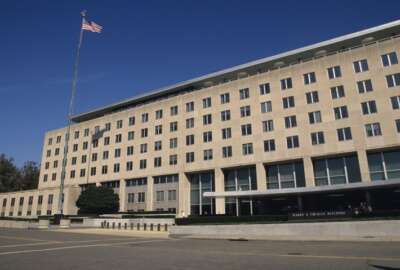The State Department, still prioritizing but no longer limiting passport services to Americans with life-or-death emergencies, is asking passport services employees still out on weather and safety leave to self-certify whether they’re considered high-risk for COVID-19.
According to the National Federation of Federal Employees Local 1998, which represents passport services employees, the agency asked employees to complete a survey by Oct. 30 to certify whether they had any of the following medical conditions:
- Currently have cancer
- Chronic kidney disease
- Chronic obstructive pulmonary disease
- Weakened immune system from organ transplant
- Severe obesity (BMI greater than 40)
- Serious heart condition (heart failure, coronary artery disease or cardiomyopathy)
- Sickle Cell Disease
- Type Two Diabetes
The State Department will have employees not considered a high-risk for COVID-19 return to the office by Nov. 16, NFFE 1998 told its bargaining unit members. Supervisors will have a conversation with employees about their status by Nov. 9.
The agency survey, according to NFFE, warns that employees face disciplinary action, including termination, for any “knowing and willing omission or falsification or fraudulent statement of material information.”
In an updated notice Friday, NFFE Local 1998 officials told employees that further weather and safety leave would only be considered for the conditions listed on the agency’s survey. Not responding to the survey, they added, would make employees ineligible to receive further weather and safety leave, as of Nov 19.
David Reimer, NFFE Local 1998’s chief steward, told Federal News Network that the union was still gathering information on the issue, and wasn’t able to comment further.
The union is pursuing formal redress through a negotiated grievance-arbitration process and consulting with NFFE’s legal counsel for professional guidance.
A State Department spokesperson told Federal News Network that the agency updated its guidance to ensure mission-critical employees who have certain underlying conditions have the option to remain on weather and safety leave until Phase 3 of Diplomacy Strong.
“Employees who do not self-certify as having certain underlying conditions that create increased risk from COIVID-19 are expected to return to the workplace to perform mission-critical services for the American people,” the spokesperson said. “Those employees may pursue a reasonable accommodation through the Department’s Office of Accessibility and Accommodation’s Disability and Reasonable Accommodation Division, if appropriate.”
The State Department started reopening passport services in June, after Sen. James Lankford (R-Okla.) led six other senators in a letter expressing concern over the state of the agency’s passport application backlog.
The State Department, more broadly, moved its facilities in the Washington, D.C. metro area to Phase Two of its “Diplomacy Strong” reopening strategy in July, which allowed up to 80% of employees to return to the office.
The agency published weekly passport statistics from June 11 through Oct. 1, but has stopped releasing such granular data, now that its offices are handling routine and expedited applications.
The last week of September, the State Department had 923,000 passport applications awaiting processing. That same week, the agency issued 168,000 passports and received 176,000 new applications.
All passport agencies and centers are now processing passport applications, but remain at different stages of the State Department’s three-phased reopening plan.
Passport offices will continue to prioritize in-person appointments for people with life-or-death emergencies. Americans can now submit a routine application and expect to receive a passport in 10-12 weeks, or submit an expedited request and get a passport in 4-6 weeks.
The State Department rescinded a global “do not travel” warning in August for Americans looking to travel abroad, but the agency still recommends U.S. citizens exercise caution when traveling abroad “due to the unpredictable nature of the pandemic.”
The agency continues to release country-specific travel information and advisories on its website.
Copyright
© 2024 Federal News Network. All rights reserved. This website is not intended for users located within the European Economic Area.
